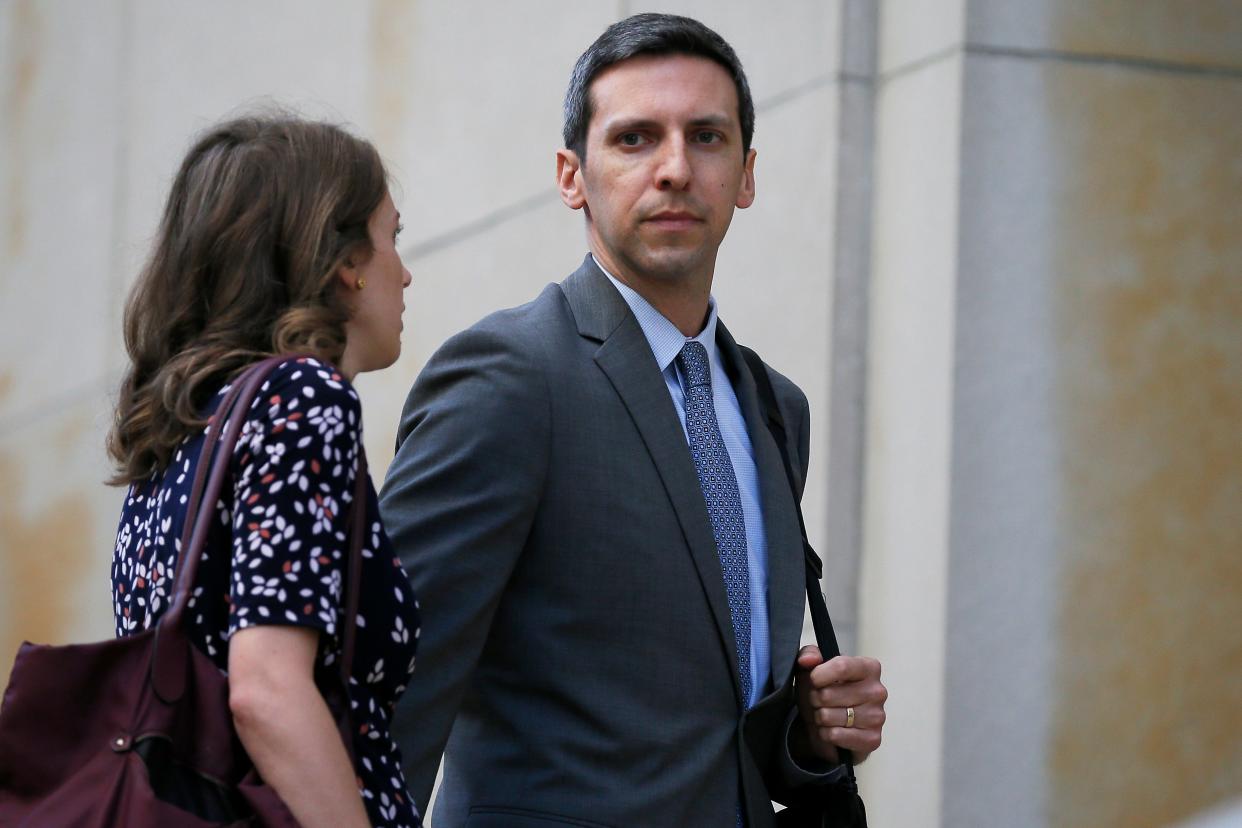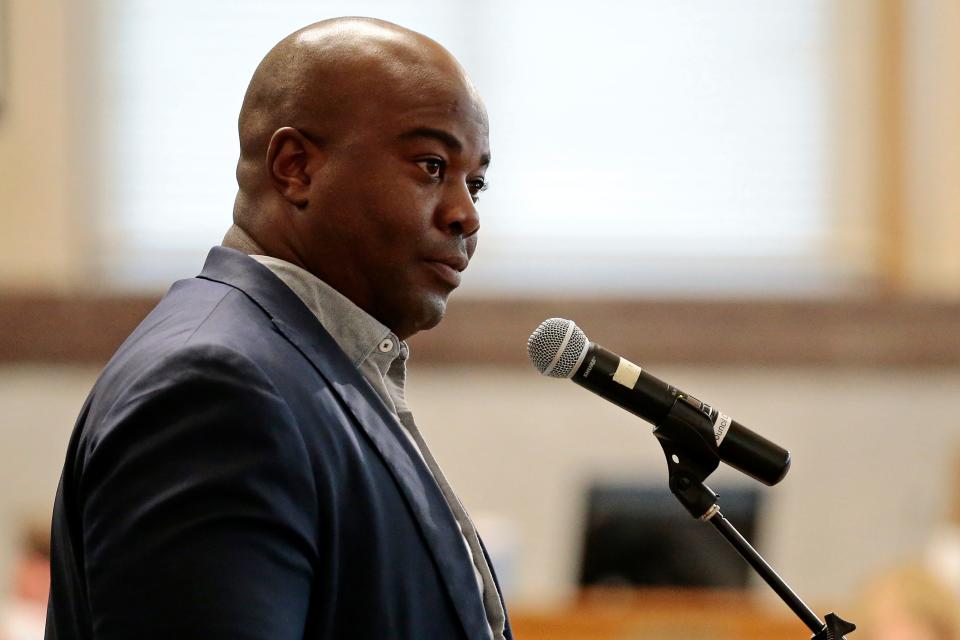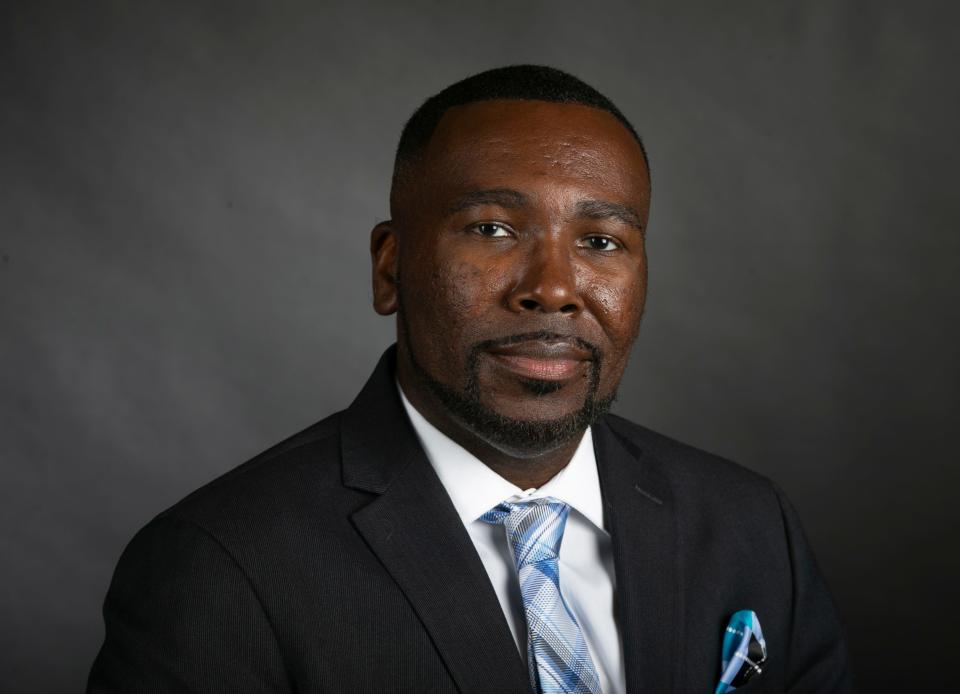Editorial: Sittenfeld trial exposed ugly underbelly of Cincinnati politics

- Oops!Something went wrong.Please try again later.
The trial of P.G. Sittenfeld, who could've been, and probably would've been our mayor, revealed a lot about the character of the former councilman and just as much about the culture of corruption infecting city government.
Sittenfeld, 37, was found guilty Friday of federal corruption charges, including bribery and attempted extortion. He could face up to 3.5 years in prison, according to a sentencing expert.
It's the story of Icarus. Sittenfeld, an immensely talented and privileged young man, was brought down by his own unchecked ambitions and arrogance. He placed his mayoral ambitions ahead of the interests of taxpayers and abandoned common sense and ethics for a few campaign contributions.
With the conviction, Sittenfeld's political career is officially over. Our hearts go out to his pregnant wife, Sarah Coyne, and their son, who are most significantly impacted by seeing their husband and father facing a prison term.

The jury deserves credit for rejecting the "everyone does it" defense. Everyone doesn't do it, and even if they did, we shouldn't stand still for it.
The trial revealed that it's an all-too-common practice for some Cincinnati politicians to lean on developers for donations. This has several bad effects, in addition to tainting political outcomes.
First, it hampers development. If developers think they have to pay local politicians for the privilege of doing business in Cincinnati, they are likely to pass those (hidden) costs onto taxpayers, inflating the cost of local projects.
Second, it warps policy outcomes. If the city is rewarding contracts based on who pays, rather than best use of a property, that's going to hamper the quality of development decisions.
Third, the system punishes honest business owners who will be discouraged from pursuing projects in the city because they don't like how the game is played.
It's troubling, if not entirely surprising, how Sittenfeld coached developers on how to skirt campaign finance rules so he could line his coffers with more of their money. Telling developers to set up multiple limited liability corporations, or LLCs, in order to sidestep individual donor limits might not have been illegal back then, but it sure spit in the face of the spirit of the law.
To be clear, no one should feel sorry for developers like former Bengal Chinedum Ndukwe, an FBI informant and the prosecution's star witness. They are far from victims here. Ndukwe did bad things and had a proffer agreement with federal prosecutors, so he had little choice but to cooperate with their investigation. Every developer who gives a donation isn't corrupt, but too many of them have enabled a crooked culture at City Hall by participating in the pay-to-play machinations of Sittenfeld and others.

Looking ahead, our problem isn't P.G. Sittenfeld. Our problem is a pay-to-play political system and a city and state politics plagued by corruption and self-dealing. Getting rid of one corrupt member of council (or three if you count Tamaya Dennard and Jeff Pastor), is not enough. But it is a good start.
Corruption isn't even a party-based issue, in case you want to blame Democrats (see Pastor and former Ohio House Speaker Larry Householder). This is a problem on both sides of the aisle, and it's hard to increase accountability and eliminate cronyism through legislation when the players benefit by perpetuating the game. Las Vegas wasn't built on winners, and politics isn't largely in the business of fixing.
That's where voters come in. Voters started the process of cleaning up Cincinnati's house in last November's election. Now they should ask that persons running for elected office in the future voluntarily take a pledge to not accept any campaign donations from developers wanting to do business with the city. Developers tired of getting shaken down by politicians would benefit most from such a pledge.
In 2018, voters passed a charter change that limited campaign contributions so that individuals can either give up to $1,100 as themselves or an LLC, but not both or under multiple LLCs. Perhaps, we need to examine if there are even more ways to increase the transparency of political donors. It could even be argued that it's time to get big money out of Cincinnati politics altogether.
Television and newspaper ads, radio spots and billboards are not cheap. But no politician running for office here needs to raise $1 million to win a seat on council or even the mayor's office. This isn't New York City.
The huge sums of money that Sittenfeld and others, like former mayor John Cranley, raised were about greed, arrogance and bragging rights. But most of all, it was about power.
Sittenfeld wanted to use his campaign warchest not only for his own political ambitions, but to manipulate the future of council itself, by funding and getting candidates elected who could deliver votes for his agenda. Turns out the "Gang of Five" text messaging scandal was just the tip of the power-play iceberg for Sittenfeld.
If politicians like Sittenfeld had put as much time and energy into fighting poverty or the affordable housing problem as fundraising and shaking down developers, our city might be in better shape. In fact, a just resolution would be if the judge ordered every dime in Sittenfeld's PAC that came from developers go into the city's Affordable Housing Trust Fund.
During a time when faith in our democracy and government is reaching crisis levels, we cannot afford any further erosion – and so people who opt into this line of work need to err on the side of above board, always. We should have the highest ethical standards for our public servants, as they steward public resources and public trust. If the game requires you to get dirty to win, the reality is people will continue to come out covered in mud and our city will suffer for it, whether they are caught and prosecuted or not.
Being an elected official is a serious job with serious responsibilities. But the fact that basically anyone can run for and potentially win elected office means that we need to do a better job helping new public servants learn the rules. There should be ample support to help legislators know exactly where the lines are (see the Joint Legislative Ethics Commission in Columbus). Not that this was necessarily a factor in the Sittenfeld case, but this has been a good reminder that we shouldn’t assume everyone has the same awareness, understanding or interpretation of what’s above board and what’s not, and we should have centralized resources that elected leaders can use so there is no question.

The FBI has Cincinnati in its sights now, which hopefully will be enough to scare any wannabe crooked politicians straight. And based on some of the revelations at trial about other local politicians who were possibly engaged in quid pro quo activities, there could be more investigations, arrests and trials. And if the feds were able to nail Sittenfeld, Pastor might want to start thinking about cutting a deal, considering the receipts investigators have on him. Nor does Friday's outcome bode well for Householder, who will be in that same courthouse in January.
This high-profile trial has been a black eye for the city and costly to taxpayers. How costly we don't know because the judge wouldn't allow any talk of the investigation's expense at trial. One might surmise, it was probably a lot. But even though this sad affair was expensive and painful to watch, and there could be even more consequences for others ahead, accountability and transparency are always a win for taxpayers.
Opinion and Engagement Editor Kevin S. Aldridge writes this on behalf of The Enquirer's editorial board, which includes Editor Beryl Love, Senior News Director of Content Jackie Borchardt and community board members Jackie Congedo, Mack Mariani and Rachel Citak.

This article originally appeared on Cincinnati Enquirer: Editorial: Sittenfeld trial exposed underbelly of Cincinnati politics

